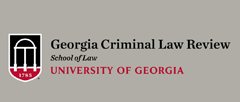Georgia Criminal Law Review
Document Type
Notes
Abstract
The American dream promises wealth, mobility, and security, yet daily millions of Americans live in abject poverty. What’s more, state and local policies render low-income people uniquely vulnerable to criminalization, further lessening their ability to attain this purported American dream. These effects are not incidental. Rather, they reflect a complexly interwoven system of wealth-based discrimination oftentimes promulgated and perpetuated by government actors. Yet, most constitutional anti-discrimination measures do not reach wealth-based discrimination despite the horrific everyday effects felt by low-income communities nationwide. The criminalization of poverty compounds these problems to create a never-ending cycle of discrimination and collateral consequences whose aftershocks are felt for generations to come. These problems beg solutions in the form of expanded constitutional protection for low-income people, namely, in holding government actors accountable for their anti-poor policies by creating a bright-line rule for wealth-based discrimination to be regarded at a higher level of scrutiny. Modern reality elucidates the extent to which the current body of relevant law is not only muddled, but out of touch with Americans’ every-day, and creates more questions than answers as to how to reconcile this ever-growing problem. As more and more low-income people face jail solely on account of their poverty by the day, recognizing their plight as one of discrimination highlights the systemic importance of this issue. Recognizing the criminalization of poverty as a constitutional problem rather than isolated within the criminal justice context commands the gravity of the courts that it deserves, while preserving remedies for low-income people whose rights are violated on the daily.
This Note explores how the Supreme Court’s current Equal Protection jurisprudence inadequately addresses issues of wealth-based discrimination, particularly within the criminal justice system. The Note proposes a strict scrutiny framework towards wealth-based discrimination based on the complex social, political, economic, and legal forces that render low-income people disproportionately vulnerable to criminalization. Above all, this Note advocates for a reconsideration of how legal advocates address this complex sociopolitical issue as a means of radical lawyering and holding the government accountable for its discrimination against low-income people.
Recommended Citation
Smolyar, Alexandra
(2024)
"Paying for Prison: Equal Protection Remedies for the United States' Wealth Discrimination Problem,"
Georgia Criminal Law Review: Vol. 2:
No.
2, Article 5.
Available at:
https://digitalcommons.law.uga.edu/gclr/vol2/iss2/5

